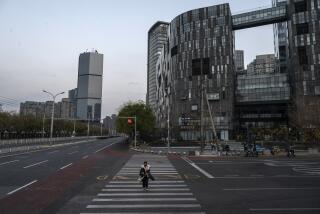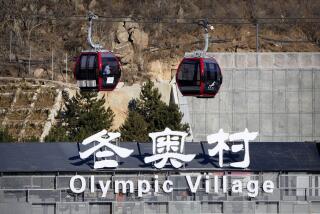Soaring tourism, hidden dollars
- Share via
HONGCUN, CHINA — The Ming and Qing dynasties built this town at the foot of China’s famed Yellow Mountains. More than 600 years later, “Crouching Tiger, Hidden Dragon” put it on the map.
Since the hit movie was filmed here, thousands of tourists have traipsed through flagstone streets to resident Wang Qingping’s cedar house to see Moon Pond and ancestral halls as impressive as those in Beijing’s Forbidden City.
To keep the tourists happy, the local government banned Wang, 66, and other villagers -- many of them tea farmers -- from opening their windows and raising pigs in the town.
“I feel powerless,” Wang said.
He and the 1,400 residents of Hongcun are mere props in China’s tourism boom. The Asian giant is riding a tourism wave thanks to a runaway economy and a worldwide fascination with the rapidly developing nation. People are flocking to see the Great Wall, the ancient terra cotta warriors in Xian and lesser-known relics, such as Hongcun in south Anhui province.
But the hefty admission fees that tourists fork over often end up in the pockets of politically connected companies. These businesses have secured access to priceless temples, tombs, grottoes and other antiquities from Beijing to the far western borders in Tibet.
Like land grabs that have plagued rural China, these deals are cut quietly between businesspeople and local party bosses. Chinese and Western conservationists say villagers are left out of these negotiations and alienated from their heritage. Some can no longer freely visit temples or use buildings and land that have been in their families for generations.
A few years ago, Zhongdian Qianhushan Ecotourism Development Co. secured rights to build a tourist resort near Jisha Village in southwest China. The resort would be a gateway to sacred Tibetan mountains, which command breathtaking views of alpine lakes and lush meadows.
Zhongdian persuaded dozens of Tibetan families who raised yaks for a living to turn over their traditional lands. The illiterate villagers couldn’t read the details of the contract that they had approved with their fingerprints.
They later learned that highways would replace their prime pastures. For that, they would receive an annual payment of $31,000 to $50,000.
“I don’t object to tourism companies being involved in development,” said He Xuzhong, founder and director of Beijing Cultural Heritage Protection Center, a nongovernmental organization. “But they should respect cultural relics and take care of locals. Regrettably, many cases are not like that.”
The company that runs Hongcun’s tourist operations, Beijing Zhongkun Investment Group, raked in more than $600 million last year from operating historical sites and other businesses.
It is controlled by Huang Nubo, a former Communist Party Propaganda Department section chief who, with an estimated net worth of $531 million, was ranked by Forbes magazine as one of China’s richest people. The Beijing University graduate is a top administrator at an arm of the Ministry of Construction, one of the agencies responsible for preserving historical sites.
Huang first signed a pact with Hongcun’s government in 1997. Last year, the village had more than 530,000 visitors, collecting ticket sales of $2.3 million. Of that amount, two-thirds went to Beijing Zhongkun and most of the rest to county and town governments. The villagers’ share: about $90 per person.
On a recent afternoon in Hongcun, tour groups alighted from buses in a dirt parking lot furnished with a toilet and a wooden ticket booth. Signs in English, Chinese and Korean helped them navigate the village, about the size of Walt Disney Co.’s California Adventure theme park.
The visitors jammed onto an arch bridge, snapping pictures of giant lotus leaves swaying below, before passing through Hongcun’s high walls.
Once inside, tourists gazed at Hongcun’s famous water system, which runs alongside each house so that residents can draw water for cooking and washing. The stream flows into the moon-shaped pond in the center of Hongcun, then out into farmlands.
Wang, a retired engineer, sat in the courtyard of his 220-year-old Qing Dynasty home that he inherited from his father, who inherited it from his own father.
Mythical figures, animals and plants were exquisitely carved on brackets, lattices and arches in the interior of the two-story house. In the central hall, Wang often serves locally grown green tea to visitors before leading them up to see the second-floor veranda that runs around the courtyard. Wang borrowed $25,000 from relatives in recent years to put in new columns and make other repairs.
In 2000, Ang Lee’s “Crouching Tiger, Hidden Dragon,” a martial arts love story starring Zhang Ziyi, brought fame to Hongcun when it played to packed theaters around the world, winning four Academy Awards. The movie was filmed here to reflect a traditional Chinese village.
Later that year, the United Nations named Hongcun a World Heritage Site, for its “outstanding example of traditional human settlement
The morning after the United Nations’ announcement, Hongcun residents gathered under 400-year-old ginkgo and pine trees at the gates of the village. They shot off firecrackers to celebrate.
About 33 of the 830 sites on the United Nations Educational, Scientific and Cultural Organization list are in China. Beijing has 60 sites on a tentative list to receive the designation, which is promptly placed in marketing brochures.
Wang Tongfu, a stout 74-year-old who operates a souvenir stand here, said that two decades ago Hongcun attracted several thousand people a year. Nowadays, villagers see that many visitors in a single day.
Wu Binshen, a 28-year-old from Shanghai, said he fell in love with Hongcun on his first visit in early 2001. The crowds weren’t so thick then and villagers were friendly.
Wu has returned every few months, but he has heard more grumblings from residents: about their low incomes, pollution in the waterway and rude tourists swarming their houses.
The last time Wu visited, he paid $10 for admission. He was infuriated to learn that residents got a only tiny fraction of that amount. “That’s not reasonable,” he said.
Some residents fought back. In 2000, more than 600 of them signed petitions. They wrote letters to Beijing. None was answered. They sued, but the local court refused to hear them.
Protests pushed the local government, Yi County, and Huang’s company to boost villagers’ share of ticket revenue in 2001 to 8% and to set aside 20% for a county heritage protection fund.
But residents say they don’t know where that went.
“Some of the houses are shaking,” village head Wang Juyuan said. She estimated that two dozen houses needed urgent attention. “We haven’t received a penny.”
Hu Ruilin said he could have used some money from gate receipts. Two years ago, the roof of his family’s ancient house collapsed. Tiles came crashing down. Hu, 59, said he couldn’t afford to fix it. So he and his wife and two sons moved into a flat-roof concrete dwelling on the edge of town.
Li Anchun, Yi County’s tourism chief, said that officials distributed 20% of ticket sales for preservation efforts last year but he couldn’t provide details.
“Ordinary people always want more .... but we government have to consider various aspects and combine long-term tourism development with local people’s interest,” Li said.
Residents of Hongcun blame the local government and corruption for their problems.
But Huang, the 50-year-old chairman of Beijing Zhongkun, scoffed at that allegation. He denied that he or his company received special favors from government officials.
Huang said he first invested in the village because the head of Yi County then was an old friend and wanted to develop tourism to help lift the farming area out of poverty. Huang said he had reinvested all the profits from Hongcun and plowed in much more to develop and market hotels and other attractions here.
Beijing Zhongkun has tourism projects around the country: stone villages and ancient tombs along the old Silk Road in Xinjiang region; hunting and skiing resorts in inner Mongolia; and ancient towns and temples in Mentougou in west Beijing.
After being criticized by UNESCO for poorly managing its cultural relics, the central government in Beijing issued an order in 2002 that prohibited companies from operating the nation’s heritage sites.
Authorities have curtailed development of some historical attractions, including projects operated by Beijing Zhongkun. But overall enforcement is weak.
It’s common for such directives to get “progressively eroded at the local level,” said Minxin Pei, China program director at Washington’s Carnegie Endowment for International Peace. “This regulation has to be enforced at the local level.”
More to Read
Sign up for The Wild
We’ll help you find the best places to hike, bike and run, as well as the perfect silent spots for meditation and yoga.
You may occasionally receive promotional content from the Los Angeles Times.







